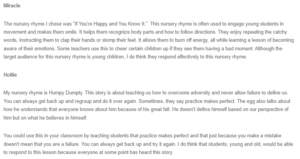Peer Responses – Nursery Rhyme
Responding to Miracle
Hi Miracle,
Thank you for sharing your insightful perspective on the nursery rhyme “If You’re Happy and You Know It.” I wholeheartedly agree with your assessment of its effectiveness in engaging young students and fostering a joyful and supportive classroom environment. The rhyme’s promotion of movement and body part recognition not only adds fun to the learning experience but also contributes to the development of coordination and motor skills in children. I am also impressed by your recognition of how the nursery rhyme helps children become aware of their emotions. Through the song’s actions, children are provided with a means to express their happiness, fostering a deeper understanding of their own emotions and how to effectively respond to them (Blasco-Magraner et al., 2021). This emotional awareness is a crucial aspect of their overall development. Furthermore, I agree with your observation that the nursery rhyme’s appeal extends beyond its intended audience. Its universal nature elicits genuine and enthusiastic responses from learners of all ages, making it a versatile and timeless educational resource.
References
Blasco-Magraner, J. S., Bernabe-Valero, G., Marín-Liébana, P., & Moret-Tatay, C. (2021). Effects of the educational use of music on 3- to 12-year-old children’s emotional development: A systematic review. International Journal of Environmental Research and Public Health, 18(7), 3668. https://doi.org/10.3390/ijerph18073668
Responding to Hollie
Hello Hollie,
Your insights on the nursery rhyme “Humpty Dumpty” are greatly appreciated. Your perceptive analysis of the rhyme as a story of resilience and overcoming adversity is commendable, as it teaches children the valuable lesson of not allowing failure to define them (Masten & Barnes, 2018). I agree with your emphasis on the phrase “practice makes perfect,” which reinforces the notion that mistakes are a natural part of learning and should not diminish one’s worth or abilities. Encouraging young students to embrace a growth mindset and persevere through challenges is a crucial aspect of their development. Your observation regarding the egg’s self-perception, independent of others’ opinions, is thought-provoking. It underscores the significance of self-confidence and the ability to shape one’s identity free from external judgments. I concur with your conclusion that the lessons of Humpty Dumpty resonate with learners of all ages due to the story’s familiarity and universal message. It is a testament to the enduring relevance and broad appeal of this nursery rhyme.
References
Masten, A., & Barnes, A. (2018). Resilience in children: Developmental perspectives. Children, 5(7), 98. https://doi.org/10.3390/children5070098
ORDER A PLAGIARISM-FREE PAPER HERE
We’ll write everything from scratch
Question 

Peer Responses – Nursery Rhyme
Miracle
The nursery rhyme I chose was “If You’re Happy and You Know It.” This nursery rhyme is often used to engage young students in movement and makes them smile. It helps them recognize body parts and how to follow directions. They enjoy repeating the catchy words, instructing them to clap their hands or stomp their feet. It allows them to burn off energy, all while learning a lesson of becoming aware of their emotions. Some teachers use this to cheer certain children up if they see them having a bad moment. Although the target audience for this nursery rhyme is young children, I do think they respond effectively to this nursery rhyme.
Hollie
My nursery rhyme is Humpy Dumpty. This story is about teaching us how to overcome adversity and never allow failure to define us. You can always get back up and regroup and do it over again. Sometimes, they say practice makes perfect. The egg also talks about how he understands that everyone knows about him because of his great fall. He doesn’t define himself based on our perspective of him but on what he believes in himself.
You could use this in your classroom by teaching students that practice makes perfect and that just because you make a mistake doesn’t mean that you are a failure. You can always get back up and try it again. I do think that students, young and old, would be able to respond to this lesson because everyone at some point has heard this story.
